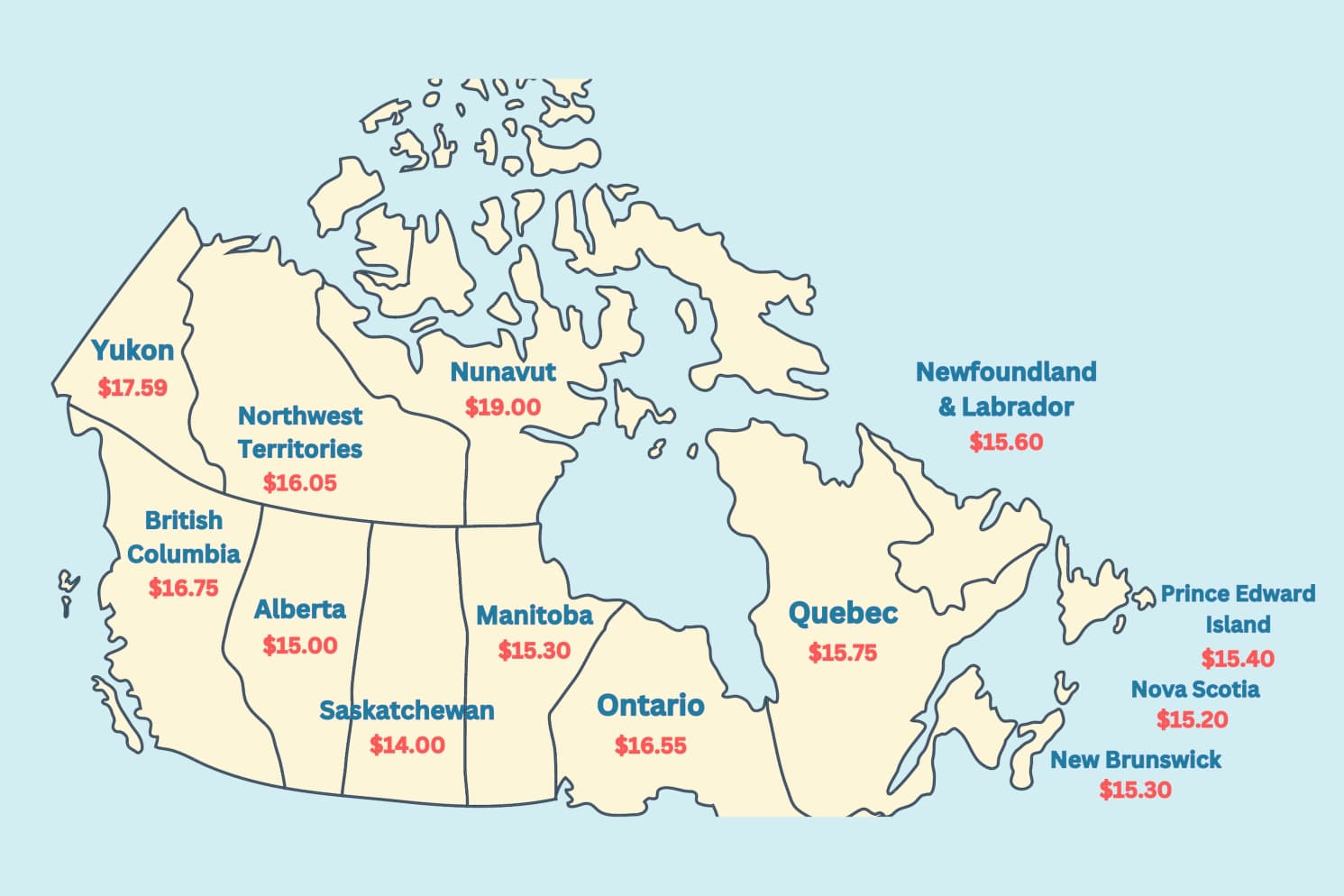Minimum Wage in Canada by Province (Updated for 2024)
Minimum wage affects the quality of life of millions of Canadians. Learn what influences these rates and how they differ by province.

Canada has a competitive minimum wage rate globally. As of April 2024, the federal minimum wage in Canada stands at $17.30 CAD per hour — quite a bit higher than the US federal rate of $7.25 USD ($9.94 CAD, at the moment of writing). However, Canada's minimum wage rate varies as each province has the authority to set its own rates.
Whether you're entering the job market in Canada, running a business, or simply curious, keeping an eye on minimum wage rates can have a significant impact on your financial well-being.
1. Federal vs. Provincial Minimum Wage
In Canada, the responsibility for setting minimum wage falls on individual provinces and territories. While the federal government does set a minimum wage rate, it only applies to federally regulated industries like banking, airlines, and interprovincial railways. For most Canadian citizens, the provincial or territorial minimum wage is what matters.
2. Minimum Wage Rates by Province (as of 2024)
Minimum wage in Canada varies from province to province and often changes annually or even semi-annually, impacting paychecks and labor costs. Here's a breakdown by province of minimum wage rates in Canada, together with the corresponding take-home pay estimated for a single individual with no dependents. Hourly rates were converted to annual salaries based on a standard 40-hour work week and full-time employment throughout the year.
| Province | Minimum Hourly Wage | Yearly Gross Salary | Monthly Salary After Tax |
|---|---|---|---|
| Canada (federal) | $17.30 | $35,984 | $2,470 |
| Alberta | $15.00 | $31,200 | $2,211 |
| British Columbia | $16.75 | $34,840 | $2,425 |
| Manitoba | $15.30 | $31,824 | $2,187 |
| New Brunswick | $15.30 | $31,824 | $2,181 |
| Newfoundland and Labrador | $15.60 | $32,448 | $2,212 |
| Northwest Territories | $16.05 | $33,384 | $2,394 |
| Nova Scotia | $15.20 | $31,616 | $2,155 |
| Nunavut | $19.00 | $39,520 | $2,815 |
| Ontario | $16.55 | $34,424 | $2,374 |
| Prince Edward Island | $15.40 | $32,032 | $2,194 |
| Quebec | $15.75 | $32,760 | $2,161 |
| Saskatchewan | $14.00 | $29,120 | $2,059 |
| Yukon | $17.59 | $36,587 | $2,533 |
3. Special Minimum Wage Categories
As we've seen, the minimum wage in Canada isn't one-size-fits. Several provinces have special categories with different wage rates. These categories account for other forms of income or to provide employment incentives. Examples of this include:
- Liquor Servers: In provinces like Ontario and British Columbia, liquor servers often have a lower minimum wage to account for tips.
- Inexperienced Employees: Some provinces, like Alberta, have a lower wage rate for employees under 18 or those who are new to the job market to incentivize employers to hire this class of workers.
- Students: To encourage part-time employment among students Alberta subjects students under 18 to a different wage rate.
- Homeworkers: In Ontario, people who do paid work from their homes have a higher minimum wage rate to account for the lack of benefits.
- Workers Receiving Gratuities: In Quebec, workers who typically receive tips, like restaurant servers, have a lower minimum wage.
- Construction Workers: In Manitoba, those in the construction industry have variable rates based on occupational classification.
4. How Provinces Decide on Minimum Wage
Of course, the process of setting minimum wage rates in Canada isn't random. It's carefully planned, painstakingly debated, and influenced by a variety of factors. For example, many provinces adjust their minimum wage based on the Consumer Price Index (CPI) to help the wage keep pace with inflation and the cost of living.
Some provinces form special committees made up of labor, business, and government representatives to review and recommend changes to the minimum wage, even allowing citizens to voice their opinions on proposed changes.
5. Taxes on Hourly Wages
After-tax salaries are what most of us care about. And it's no different with the minimum wage rate — what you see isn't what you get. Here's how taxes affect earnings from minimum wage:
- Income Tax: Both federal and provincial income taxes will be deducted from hourly wages. The rate varies depending on total annual income and by province.
- Canada Pension Plan (CPP): If you're over 18, a portion of your earnings will go towards providing a basic income for retirees.
- Employment Insurance (EI): A small percentage is also taken to provide temporary income support for the unemployed.
- Take-Home Pay: After all these deductions, what you're left with is your take-home pay. For example, if you're earning the minimum wage of $15.00 in Alberta, your take-home pay might be closer to $12.75 per hour, depending on various factors like additional benefits or deductions.
Want to calculate your take-home pay in Canada? Check out our Canada salary calculator and discover your salary after tax in any province.